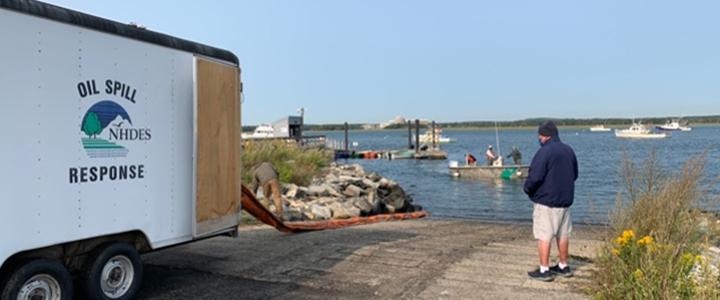
Oil Spill Training Exercise
On September 16, the NHDES Spill Response and Complaint Investigation (SRCIS) responders met at Hampton Harbor with the US Coast Guard and the Harbor Master for our annual oil spill training exercise. Originally planned for 120 participants at the Portsmouth incident command post, the typical exercise was not feasible due to risk associated with current COVID-19 pandemic. However, this annual event is an important opportunity to practice response coordination skills, and reinforces our strong partnerships with other agencies. SRCIS decided to design a smaller response using a virtual command post. The exercise simulated a release from a fuel delivery truck damaged by a passenger car collision. In this fictional scenario, the impact caused the release of thousands of gallons into the harbor.
SRCIS responders used NHDES equipment stored at the harbor and a response vessel to deploy 1,000 feet of boom around the fuel docks. The successful deployment, complicated by high winds, allowed a good opportunity to practice skills necessary for surface water protection and allowed a representative of Hampton Fire Department to observe how this equipment is used. SRCIS plans to train the HFD on boom deployment once we are able to work closely again.
During the field deployment, SRCIS and the USCG representatives operated an on-scene command post, working through the command decisions and coordinating the response to the spill. Using NHDES mobile command vehicle, an internet hot spot, and response laptops, the Hampton Harbor command connected with a network of other staff and agencies. Discussions about the spill scenario were able to be held between the field command post and various other agencies in remote locations. Field assessment teams in Hampton were able to use an app to provide oil sightings to the situation unit while working in multiple locations. Live video of the boom deployment was streamed to the meetings using a cellphone on the tow vessel.
Differences in agency policies complicated data sharing and no one platform is approved for all agencies. During the planning of the exercise and the event itself, many work-arounds and proposed solutions were given. Recommendation for best practices and multi-agency plans are currently being developed. Ultimately, the exercise showed that we are able to support a successful spill response while functioning remotely. n




